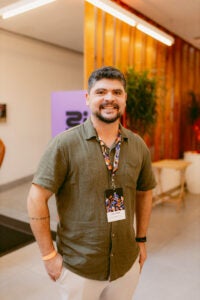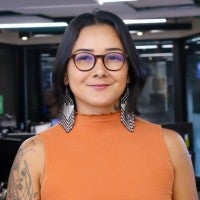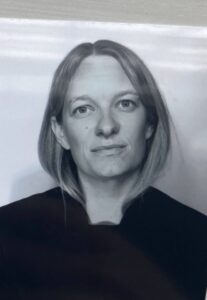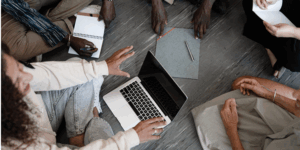
On Demand
$0.00
Climate Journalism and COP30: From science to local solutions and fighting disinformation
As the world prepares for COP30 in the Brazilian Amazon, climate change isn’t just a scientific or political issue; it’s a story that touches communities everywhere. How can journalists cut through disinformation, make sense of complex scientific information, and amplify local voices in ways that audiences trust?
Join our on demand course, Climate Journalism and COP30: From Science to Local Solutions and Fighting Disinformation, organized by the Knight Center for Journalism in the Americas in partnership with Amazônia Vox, with support from the Itaú Foundation and Roche. Instructors Daniel Nardin and Larissa Noguchi will guide you in reporting climate stories with accuracy, depth, and credibility.
By the end of the course, you’ll be able to:
-
Translate complex climate science into clear, accessible stories.
-
Spot disinformation and greenwashing in climate coverage.
-
Feature local voices and highlight community solutions.
-
Strengthen credibility through fact-checking and primary sources.
This course is open to journalists, communicators, students, and media professionals who want to improve their climate coverage and report with confidence ahead of COP30.
Enroll for FREE and take the first step toward delivering accurate, impactful climate journalism.
This course is asynchronous, meaning there are no required live events, and you can complete activities at your own pace throughout each week.
The material is organized into three modules covering various topics through videos, interviews, readings, and discussion forums:
Introductory Module – Climate in Perspective: Local Voices and Global Impacts
This module introduces the context of COP30 and climate reporting, showing how to link global commitments with local realities. You’ll learn how to gather climate information from diverse sources, understand the science behind it, and highlight community-driven solutions.
Guest Speakers:
- Ana Carolina Cazetta – Coordinator of the Amazônidas for Climate Network and PhD student at USP
- Priscilla Santos – Senior climate policy and finance specialist, founder of CLIMATICA and co-founder of Amazônidas for Climate
Module 1 – Covering Climate and COPs: Concepts, Tools, and Narratives
This module provides essential foundations for climate journalism, including key concepts, scientific terminology, and narrative strategies. You’ll learn how to translate complex climate science and international commitments into clear, accessible reporting and develop strategies for engaging COP30 coverage.
Guest Speakers:
- Ciro Brito – Lawyer and senior climate policy analyst at ISA, Vice President of CBJC, and mentor at LACLIMA
- Maria Gabriella Souza – Climate policy analyst at LACLIMA, researcher, and educator in climate leadership
Module 2 – From Science to Truth: Investigation, Credibility, and Climate Disinformation
This module focuses on practical skills for investigating climate issues, countering disinformation and greenwashing, and reporting with credibility. You’ll learn fact-checking methods, how to use primary sources, and strategies to ensure accuracy in COP30 and climate reporting.
Guest Speakers:
- Thalison Correa – Tembé Indigenous leader and Programs Coordinator at Climate Reality Project Brazil
- Lise Tupiassu – Vice-Rector for International Relations at UFPA, professor, researcher, and federal prosecutor
Register now for free and gain immediate access to the introduction module materials.
If you have any questions, please contact us at journalismcourses@austin.utexas.edu.
 Daniel Nardin: Journalist with a degree from the Federal University of Pará (UFPA) and a master’s in Communication and Society from the University of Brasília (UnB). Nardin is a fellow of the International Center for Journalists (ICFJ), a member of the Oxford Climate Journalism Network, and an instructor for the Solutions Journalism Network. He has 20 years of experience in journalism and communications in the Amazon, working in newsrooms, the public sector, and private organizations. Daniel Nardin is the founder and leader of the Amazônia Vox project, which produces solutions journalism and maintains a database of sources and freelance journalists from the Amazon. Nardin is the winner of the 2024 Roche International Health Journalism Award and the Sebrae Journalism Award (national category). He serves on the boards of AJOR (Association of Digital Journalism) and Jeduca (Brazilian Association of Education Journalists).
Daniel Nardin: Journalist with a degree from the Federal University of Pará (UFPA) and a master’s in Communication and Society from the University of Brasília (UnB). Nardin is a fellow of the International Center for Journalists (ICFJ), a member of the Oxford Climate Journalism Network, and an instructor for the Solutions Journalism Network. He has 20 years of experience in journalism and communications in the Amazon, working in newsrooms, the public sector, and private organizations. Daniel Nardin is the founder and leader of the Amazônia Vox project, which produces solutions journalism and maintains a database of sources and freelance journalists from the Amazon. Nardin is the winner of the 2024 Roche International Health Journalism Award and the Sebrae Journalism Award (national category). He serves on the boards of AJOR (Association of Digital Journalism) and Jeduca (Brazilian Association of Education Journalists).
 Larissa Noguchi: Originally from Pará, in the Amazon region, Larissa is a digital content specialist with a focus on environmental issues and the Amazon. She is pursuing a master’s degree in Digital Communication and Data Culture at FGV, where she researches communication, territories, and climate monitoring. She works on the communications team of the Brazilian Fund for Biodiversity (FUNBIO) and is a member of Agentes do Verificado, a network of content creators fighting disinformation through Purpose and the United Nations in Brazil. With 12 years of communication experience in the Amazon, Noguchi has worked in newsrooms, public communication, and the nonprofit sector. She also collaborates with Amazônia Vox, contributing to training and knowledge-sharing initiatives for communicators and journalists across the Amazônia Legal.
Larissa Noguchi: Originally from Pará, in the Amazon region, Larissa is a digital content specialist with a focus on environmental issues and the Amazon. She is pursuing a master’s degree in Digital Communication and Data Culture at FGV, where she researches communication, territories, and climate monitoring. She works on the communications team of the Brazilian Fund for Biodiversity (FUNBIO) and is a member of Agentes do Verificado, a network of content creators fighting disinformation through Purpose and the United Nations in Brazil. With 12 years of communication experience in the Amazon, Noguchi has worked in newsrooms, public communication, and the nonprofit sector. She also collaborates with Amazônia Vox, contributing to training and knowledge-sharing initiatives for communicators and journalists across the Amazônia Legal.
 Signe Iversen: Journalist with a degree from the Danish School of Media and Journalism. Since graduating in 2021, Signe has worked as a climate and environmental journalist at DR, the Danish Broadcasting Corporation, where she developed Jorden Kalder (Earth is Calling), the first-ever weekly TV documentary series in Denmark focused on climate, nature, and the people affected. She has participated in the Danish climate initiative Rydfladen, which promotes more qualified media coverage of the climate crisis, and is the first Danish woman to join the Oxford Climate Journalism Network (OCJN). Signe is currently based in Belém, Brazil, where she freelances for various media outlets during COP.
Signe Iversen: Journalist with a degree from the Danish School of Media and Journalism. Since graduating in 2021, Signe has worked as a climate and environmental journalist at DR, the Danish Broadcasting Corporation, where she developed Jorden Kalder (Earth is Calling), the first-ever weekly TV documentary series in Denmark focused on climate, nature, and the people affected. She has participated in the Danish climate initiative Rydfladen, which promotes more qualified media coverage of the climate crisis, and is the first Danish woman to join the Oxford Climate Journalism Network (OCJN). Signe is currently based in Belém, Brazil, where she freelances for various media outlets during COP.

Knight Center for Journalism in the Americas
300 West Dean Keeton
Room 3.212
Austin, TX, 78712
Phone: 512-471-1391
Email: journalismcourses@austin.utexas.edu



